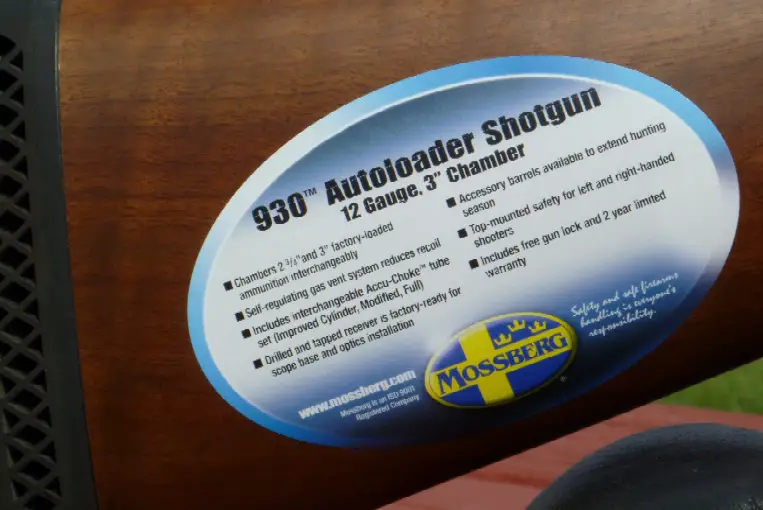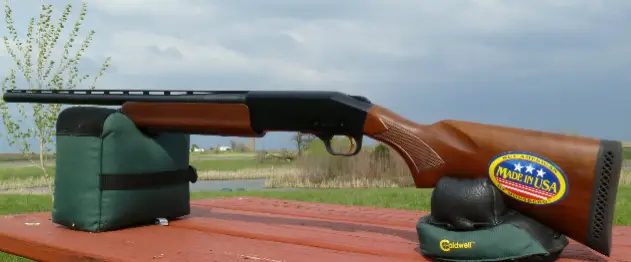


Review: Mossberg 930 12 Gauge Autoloader "A Big Surprise"

The Made in the USA Mossberg 930 has been with us for about six years by now. Mossberg has claimed that “RELIABLE AND AFFORDABLE, THIS IS THE BEST VALUE IN 3" AUTOLOADERS ON THE MARKET TODAY.” The tested, 2011 Model is the 930 “All-Purpose Field” with an American black walnut stock and a blued, twenty-six inch barrel. The basic specs are as follows.
Mossberg 930 All-Purpose Field
Item#: 85120
Gauge: 12 Gauge
Barrel: 3 inch chamber, ported barrel
Shell capacity: 5 (4 + 1)
Barrel: 26" Wide Ventilated Rib
Sights: Front Single Bead
Chokes: "Accu-Set" IC, Mod., Full
Overall length: 46 1/2 in.
Length of pull: 14 in.
DAC: 1-1/4 in.
DAH: 2 in.
Published weight: 7-3/4 lbs.
Warranty: Two Years
MSRP: $597.00
The Mossberg 930 is loaded with extra-value features and I mean loaded. The receiver is tapped for a base. The barrel is factory ported. There is a cocking indicator at the front of the trigger guard and it comes with a generous, vented recoil pad. The tang safety is ambidextrous. Studs are installed so you are all set for sling use, if desired, right out of the box. The tested model is one of over a dozen configurations currently offered by Mossberg in the 930 basic series alone.
This is certainly an affordable gun, selling for less than half the price of many gas-operated autoloaders today. There were many surprising things about this gun and the surprises began as soon as it came out of the box. That it was an affordable gun wasn't the surprise, we expected that from Mossberg.
The action was extremely smooth right out of the box. Many of today's autoloaders require shooting in and rely on some self-burnishing of the action to work smoothly and properly. Not so with this Mossberg, it was glass smooth right out of the box and functioned flawlessly with everything from cheap, one ounce payload promo shells on up.
One of my personal pet peeves is the horribly heavy triggers found on many production autoloaders. A big and pleasant surprise here, as the 930's trigger broke crisply and repeatably at just under five pounds. Six and seven pound triggers are unfortunately commonplace today, making a trip to the gunsmith almost a necessity. That wasn't the case here, as the Mossberg's trigger was more than satisfactory just as supplied.

I more or less expect a few very minor cosmetic flaws in value-priced guns. What is remarkable about this Mossberg is that there were none. The recoil pad, for example, was properly ground with no proud wood. Sure, they all “should be,” but many are not. The safety was a breeze to take off and on. Again, they all should be, but too many shotguns have stiff or otherwise cumbersome safeties.
The tested gun weighs in right at eight pounds on the nose. The combination of substantial weight and its gas action makes for a very, very soft shooting gun indeed. With 1240 fps 1-1/8 oz. target loads, there is essentially no recoil worth mentioning. This is the type of gun you'll love to shoot all day without feeling it the next day. This gun is also available as a combo set, Mossberg #85125 that adds a twenty-four inch fully rifled barrel for only any extra $63 of retail price. As is, the model as tested has a street price of just $460 or so. That's less than you'll pay for an extra barrel alone from some manufacturers. With Mossberg, you get the whole gun.
Believe it or not, I do read owners manuals and I was delighted to read a bit of honesty from Mossberg. The manual states, as far as chokes, that “lead, steel, and other non-toxic shot patterns will vary substantially based on shell length, shot size, brand of ammunition, and the individual barrel. The shooter is urged to conduct pattern tests before field use.” This has always been the case and it is refreshing to have a manufacturer actually publish this. Asking your buddy what choke you should use is generally a waste of time. If you want to know what works best, there is just no substitute for patterning your own shotgun with the shells you want to use at the ranges you plan on shooting at. Congratulations for Mossberg for printing some valuable truth in their manuals.
There are a couple areas that I can try to pick away at, if only halfheartedly. The 930's barrel is ported. Porting in a field shotgun is of no value as far as I'm concerned, and is of little to no value in shotguns in general. Nevertheless, ported barrels are supplied throughout the 930 line. I'll guess that there are enough people out there that consider it to be a “valuable no extra cost feature” of sorts, so Mossberg decided to make them all one way. The cocking indicator located at the front of the trigger guard serves no practical purpose. In a nod to getting some cost out of the gun both the tang safety is plastic. If it were Italian, it might be called technopolymer, but it can be upgraded to a metal safety at nominal cost. (After this review was initially released, I was advised by the folks at Mossberg that plastic tang safety was not a cost consideration, but proved to be better than the metal parts they had tried.)
We were all impressed with the Mossberg 930 and amazed, or at least slightly astonished that a gas-operated autoloader can be offered in 2011 that is this affordable and this good. In several ways, this $597 retail Mossberg is more versatile and more desirable than an 11-87 Sportsman Field 12 gauge that weighs a bit more, lacks the tapped receiver, retails starting at $845, and is supplied with only one choke tube as opposed to the three that comes with the Mossberg. The Mossberg also has better shell handling, for rather being forced to cycle all the shells through the action the tubular magazine is quickly emptied just by depressing the bolt release.
We asked ourselves what we couldn't do with gun and we came up empty. It is soft-shooting enough for even the most recoil-sensitive shooters, certainly pleasant enough for an afternoon on the skeet or dove field, and if you order one of the combo configurations you have a dual scattergun / rifled slug gun at a bargain price.
The empty hulls all ended up in a consistent pile, with about seven foot ejection distance, and the more we shot the 930, the more we wanted to shoot it. This walnut version is easier on the eyes than many shotguns today, and if you want shim adjustments most all of the synthetic-stocked versions offer that at as well.

As
far as Mossberg calling this the “Best Value in 3 inch Autoloaders
Today,” they got it completely right as far as I'm concerned. The
smooth action and crisp trigger of the 930 puts several more expensive
autoloaders to shame. When it comes to the price/performance ration, it
isn't possible not to characterize the Mossberg 930 as a screamingly good
deal and just a very competent autoloader in general. That Mossberg is
able to do this in 2011 with an American-made product with good shell
handling, a tapped receiver, an accommodation for a sling, an American
black walnut stock, a set of three choke tubes, and a well fitted recoil
pad for a street price well under five hundred dollars is all icing on
this value-filled cake. It is a big surprise and an exceedingly good one.
The Mossberg 930 Field is a winner, to say the very least. Congratulations
to Mossberg for what is easily the industry-leading, best-in-class product.
Copyright 2011 by Randy Wakeman. All Rights Reserved.

Custom Search

